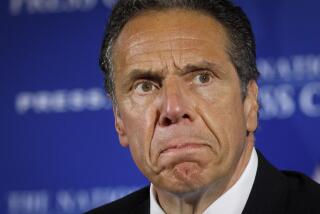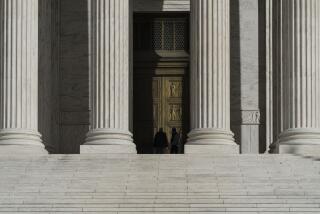UPDATE : High Court’s Ruling Due on Airport Solicitor Ban
- Share via
WASHINGTON — For most airline passengers, the scene in the terminal is a familiar one: A Hare Krishna devotee offers a pamphlet or a book and asks for a donation. Or the devotee is a follower of political extremist Lyndon H. LaRouche Jr., or a member of a religious group, like Jews for Jesus.
For years, political, religious or social organizations have found airport terminals fertile ground.
And for almost as long, airport managers have been trying to keep the solicitors out. They say passengers walk the crowded and hectic halls of an airline terminal for only one reason: to catch a plane, not to be bothered by pamphleteers and money-seekers.
But efforts to expel solicitors from airports have long been blocked by the federal courts. For 20 years, lower courts have ruled that the First Amendment’s guarantee of free speech gives solicitors a right to seek donations at airports. The hallways of a busy terminal are akin to the city streets, and therefore are open to all, the courts have said.
But this week, the Supreme Court will reconsider that premise and rule for the first time on whether an airport terminal is a “public forum” where free speech and soliciting must be allowed.
The case, International Society for Krishna Consciousness vs. Lee, 91-155, stems from a suit by Krishnas against the New York Port Authority and its director, the late Walter Lee, over a soliciting ban in the region’s three major airports: La Guardia, John F. Kennedy and Newark.
Should the court decide to uphold such a ban, the ruling would not only affect solicitors in airports, it also could rewrite the rules for those who want to picket or solicit on government property.
BACKGROUND: The high court has struggled to apply free-speech standards to government property. For example, the steps of City Hall may be considered a “public forum” where anyone can pass out leaflets or make speeches, yet city officials need not permit such activities in the mayor’s inner office.
Applying these legal standards has proved to be confusing and subjective, legal experts say.
In 1987, the Supreme Court struck down a ban on soliciting imposed by the Los Angeles Airport Authority because the ordinance was too broadly worded.
The measure sought to ban all “First Amendment activities,” which could have been read to prohibit the sale of a newspaper or passengers talking about politics. But the justices made clear they were not ruling on whether an airport terminal was a “public forum.”
The next year, New York officials issued a new regulation forbidding soliciting or the distribution of flyers, leaflets or trinkets within terminals.
A federal judge struck down the rules, contending that the airport hallways were “the functional equivalent of public streets.” But a U.S. appeals court, on a 2-1 vote, last year revived the ban, saying the purpose of an air terminal is “solely to facilitate a particular type of activity--air travel--unrelated to protected expression.”
That ban has been challenged before the Supreme Court by the Krishnas.
ISSUES: Attorneys for the three New York airports say their case is strengthened by a little-noticed 1990 opinion, in which five justices concluded that the sidewalks leading to a post office are not “public,” and therefore the government can ban all solicitors from those areas.
Based on that precedent, the New York Port Authority should be permitted to ban all those who engage in “continuous or repetitive” soliciting in the airport terminals, said one of the attorneys, Arthur Berg.
But the Krishnas counter that airport hallways are like Main Street.
“In this country, transportation centers--the gates to the modern city--have long been places for free expression,” says Los Angeles lawyer Barry A. Fisher, who is representing the Krishnas.
Some First Amendment experts fear the Supreme Court is inclined to shrink the protection for free speech and to give government officials more power to regulate unpopular fringe groups.
But others note that the more conservative court has not cut back on the right to free speech the way it has in other areas of individual liberties.
More to Read
Sign up for Essential California
The most important California stories and recommendations in your inbox every morning.
You may occasionally receive promotional content from the Los Angeles Times.














